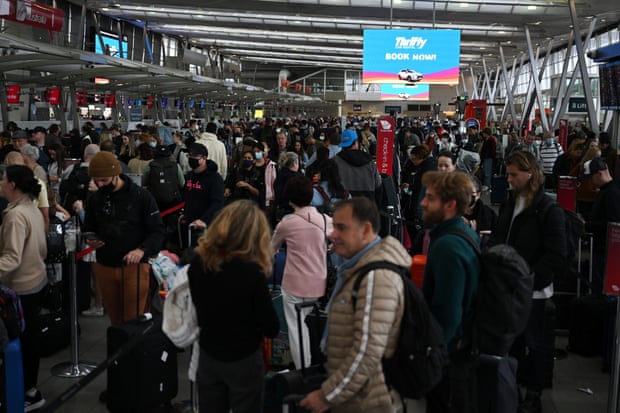Lianne and Grant Francis were supposed to be in Indonesia on their 23rd wedding anniversary, but instead spent their day in transit after their original flight was canceled.
Lianne said that a woman in a wheelchair and her husband were waiting at the gate for the outbound flight to be canceled so that they could go for their final trip together. There were children in tears waiting to board, while others paid thousands of dollars for alternative flights.

More than 4,000 people have been affected by multiple flights being canceled since the beginning of the month. The aviation industry has been in crisis for a long time.
The consumer watchdog criticized airlines for high air fares. The ground handler in the Qantas supply chain is threatening to go on strike. The decline in the national carrier's reputation for reliability has been brought about by the ABC's Four Corner's program.
In the past four months, domestic air fares have increased by over 50% due to high cost of jet fuels and upward pressure from decisions to cut capacity.
The Guardian Australia reported earlier this week that fans of the Pies who want to go to the preliminary final on Saturday will have to pay more than $1,000 for a return flight. While Australians are paying more for their tickets, the domestic airline industry is reporting its worst on-time performance on record.
According to the report, the ACCC was looking into whether Qantas' conduct raised concerns under the Australian Consumer Law, as it was aware customers had experienced a number of issues with the national carrier.
Qantas and other airlines need to make a realistic assessment of how many flights they can serve.
An important message for @AustraliaInJPN . About 25 Australians are trapped in Narita Airport due to cancelled Jetstar flight JQ0012. Due to Covid restrictions we’re not allowed to leave the airport or enter hotels. We have no food, water or bedding. We’d appreciate assistance. pic.twitter.com/p2yn2XrAeL
— Gordon Knight (@GordonlKnight) August 28, 2022
Qantas pilots, flight attendants and baggage handlers told the ABC that cost-cutting was to blame for the airline losing its way.
The cuts that have been made have been very deep. One flight attendant said that it made them feel like the company hated them.
According to the transport workers union, ground handler in the Qantas supply chain threatened to take industrial action due to the possibility of pay and conditions going backwards.
The strike was called off after workers reached an agreement with the company on a new collective bargaining agreement. The transport workers union said in a statement on Thursday that Menzies ground workers in New South Wales and Victoria secured a commitment from their company for pay increases and to insource all operations currently outsourcing.
At one point, Qantas appeared to blame customers for delays, saying they were not match fit.
You can sign up for the Morning Mail.
The national and international stories of the day are broken down in the morning email.

Following staff layoffs due to Covid-19, the managing director of independent air transport consultant Aviation Advocacy says the industry is going "hell for leather to re-recruit staff".
The long-term storage of planes during border closings has caused problems, with the civil aviation safety authority identifying the phenomenon of aircraft waking up grumpy as a syndrome of themothballing.
Qantas has acquired 12 A350s, which will fly nonstop from Australia to locations like London and New York, as a result of Project Sunrise.
One post-pandemic trend was for more narrow-body aircraft, according to Prof Rico Merkert. The trend for smaller aircraft would help airlines deal with demand variability.
Staff shortages and training are the main challenge for the Australian aviation industry as they recover from the Pandemic. All airlines in Australia are recovering thanks to freight, frequent flyer programs and small-to-private corporate jets.
"It will be another year or two before we get to some form of stability in the industry, in a similar way to times before Covid-19".
Most in the industry think there will be a recovery in 2024, but the depth of the predicted recession is not known. He believes travellers will see improvements in early next year for two reasons.
The airlines were surprised by the sudden rebound in travellers wanting to travel again. He thinks travellers will see improvements in on-time performance because airlines are now aware of the issue.
The airlines want people to be confident flying again.